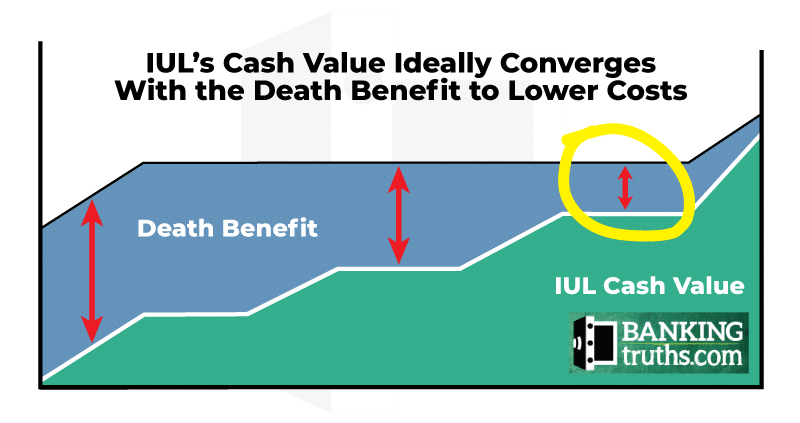All Categories
Featured
Table of Contents
Below is a theoretical contrast of historical efficiency of 401(K)/ S&P 500 and IUL. Allow's think Mr. SP and Mr. IUL both had $100,000 to conserved at the end of 1997. Mr. SP invested his 401(K) money in S&P 500 index funds, while Mr. IUL's money was the cash value in his IUL plan.
IUL's plan is 0 and the cap is 12%. Because his cash was conserved in a life insurance plan, he doesn't need to pay tax obligation!
How Does An Iul Compare To A 401(k)?

The countless selections can be mind boggling while investigating your retired life investing choices. Nevertheless, there are certain decisions that must not be either/or. Life insurance policy pays a fatality advantage to your beneficiaries if you should die while the plan is in effect. If your family would encounter monetary difficulty in the event of your death, life insurance uses tranquility of mind.
It's not one of the most profitable life insurance policy investment strategies, however it is among the most secure. A form of permanent life insurance policy, universal life insurance policy enables you to select exactly how much of your premium approaches your fatality benefit and how much enters into the plan to build up money value.

Additionally, IULs enable insurance policy holders to take out car loans versus their plan's money value without being taxed as income, though unsettled equilibriums may go through tax obligations and penalties. The primary benefit of an IUL plan is its possibility for tax-deferred growth. This implies that any kind of profits within the plan are not tired until they are withdrawn.
Alternatively, an IUL plan might not be one of the most suitable financial savings plan for some individuals, and a conventional 401(k) can show to be more advantageous. Indexed Universal Life Insurance Policy (IUL) plans supply tax-deferred development possibility, protection from market slumps, and survivor benefit for beneficiaries. They allow insurance holders to earn rate of interest based upon the efficiency of a stock exchange index while safeguarding against losses.
Should You Consider An Iul Over A 401(k) Match For Retirement?
A 401(k) plan is a preferred retirement financial savings option that enables individuals to invest money pre-tax into various financial investment devices such as mutual funds or ETFs. Companies might also supply matching contributions, additionally improving your retirement cost savings capacity. There are two major types of 401(k)s: standard and Roth. With a standard 401(k), you can decrease your gross income for the year by contributing pre-tax dollars from your paycheck, while likewise gaining from tax-deferred development and company matching contributions.
Numerous employers likewise supply matching payments, properly providing you cost-free cash towards your retirement strategy. Roth 401(k)s function in a similar way to their typical counterparts but with one trick difference: tax obligations on contributions are paid ahead of time rather of upon withdrawal during retirement years (Indexed Universal Life vs Roth IRA: Key Considerations for Retirement Planning). This implies that if you expect to be in a greater tax bracket throughout retirement, contributing to a Roth account might reduce tax obligations with time compared with spending entirely through traditional accounts (resource)

With reduced management charges generally contrasted to IULs, these sorts of accounts permit financiers to save money over the lengthy term while still gaining from tax-deferred growth possibility. Additionally, lots of popular inexpensive index funds are available within these account kinds. Taking distributions prior to getting to age 59 from either an IUL policy's cash value by means of fundings or withdrawals from a typical 401(k) strategy can cause unfavorable tax obligation ramifications otherwise managed carefully: While obtaining versus your policy's money value is usually considered tax-free up to the quantity paid in premiums, any kind of overdue financing equilibrium at the time of fatality or policy abandonment might be subject to income taxes and penalties.
Ed Slott Iul Tax Free Retirement
A 401(k) supplies pre-tax financial investments, company matching payments, and potentially even more investment choices. The drawbacks of an IUL include higher administrative expenses contrasted to typical retired life accounts, restrictions in financial investment options due to policy constraints, and prospective caps on returns throughout strong market efficiencies.

While IUL insurance might prove useful to some, it's vital to recognize how it functions before acquiring a policy. Indexed universal life (IUL) insurance coverage policies provide higher upside prospective, versatility, and tax-free gains.
firms by market capitalization. As the index moves up or down, so does the rate of return on the cash worth component of your plan. The insurance business that issues the policy may use a minimal guaranteed rate of return. There may likewise be a ceiling or rate cap on returns.

Economists usually suggest having life insurance policy protection that's equivalent to 10 to 15 times your yearly revenue. There are several downsides connected with IUL insurance plans that critics fast to explain. Someone that establishes the plan over a time when the market is performing badly might finish up with high costs payments that don't add at all to the cash value.
Besides that, keep in mind the complying with various other considerations: Insurance provider can establish participation prices for how much of the index return you receive annually. For instance, allow's state the plan has a 70% engagement rate (iul edu lb). If the index grows by 10%, your cash worth return would be just 7% (10% x 70%)
In addition, returns on equity indexes are typically capped at a maximum quantity. A policy may claim your maximum return is 10% each year, no matter exactly how well the index carries out. These constraints can restrict the real rate of return that's attributed towards your account every year, despite just how well the plan's hidden index does.
The Best Retirement Strategies: Iul, 401(k), Or Roth Ira?
IUL policies, on the other hand, deal returns based on an index and have variable premiums over time.
There are several various other sorts of life insurance policy policies, clarified listed below. provides a set benefit if the policyholder passes away within a collection period of time, usually in between 10 and thirty years. This is just one of one of the most inexpensive types of life insurance, along with the most basic, though there's no cash value accumulation.
Iul Instruments Gmbh
The policy obtains value according to a taken care of routine, and there are fewer costs than an IUL policy. A variable plan's cash value may depend on the efficiency of certain stocks or various other safety and securities, and your costs can additionally alter.
Latest Posts
Problems With Universal Life Insurance
Best Guaranteed Universal Life Insurance Companies
Iul For Dummies